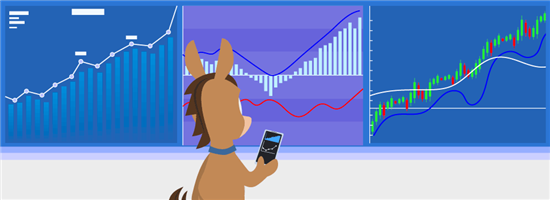Best Robo Advisors of February 2026
Investing apps can help grow your money. But you need to compare returns and fees. See which robo-advisors are worth it.
 |
| © CreditDonkey |
- Betterment for Beginners
- Ally Robo Portfolio for No Advisory Fee
- SigFig for Small Balances
- Vanguard Personal Advisor for Large Balances
- Charles Schwab Intelligent Portfolio for IRAs
- Acorns for College Students
- Empower for Retirees
- Wealthfront for Financial Tools
$20 Investment Bonus
- Open an Acorns account (new users only)
- Set up the Recurring Investments feature
- Have your first investment be made successfully via the Recurring Investments feature
Robo-advisors offer affordable hands-off investing. Now, anyone who wants to invest can.
But there are now over 200 robo-advisors on the market. Each one is different and has their unique features. How do you pick the right one?
Whether you're a rookie, have little money, or a lot to invest, there's something in this list that will fit your bill. Read on.
What are Robo Advisors?
 |
Robo-advisors provide online automated investing services. They use algorithms to select investments for you and automatically monitor your account with software. Robo-advisors can automate complicated tasks like rebalancing and tax strategizing to give you better returns.
Because robo-advisors use automated management, they can provide the service at a low cost (compared to human advisors). Many have no (or very low) starting minimums, so they're accessible to anyone with internet access.
Robo-advisors are great for:
- Beginners who don't feel confident investing on their own
- Beginners without a lot of money to invest
- Investors who want to be completely hands-off
How Much Do Robo Advisors Cost?
Typically, robo-advisors charge a percentage of your assets under management. This fee would be all-inclusive of management, software, and trading fees. For example, if the annual fee is 0.25% and you have $1,000 in your account, your fee would be $2.50 yearly.
Some robo-advisors charge a flat rate monthly fee. And some even offer the service free of advisory fees. It's important to compare advisory fees and minimum requirements against features you want.
Here are the fees and minimums for our top rated robo-advisors:
| Robo Advisor | Fee | Minimum |
|---|---|---|
| Betterment | $4/month | $0 |
| Ally Robo Portfolio | 0% for cash-enhanced portfolio | $100 |
| Sigfig | $0 | $2,000 |
| Vanguard Personal Advisor | ~0.30% - 0.31% | $50,000 |
| Charles Schwab Intelligent Portfolio | 0% | $5,000 |
| Acorns | starts at $3/month | $0 |
| Empower | 0.89% | $100,000 |
| Wealthfront | 0.25% | $500 |
Best Robo-Advisors
 |
| © CreditDonkey |
Here are our favorite robo-advisors for every kind of investor.
Robo advisors are not FDIC insured since that only protects your bank deposits. However, they are SIPC insured, which insures investments held at brokerage firms should it go out of business. You are protected up to $500,000 per account type.[1]
Betterment: Best for New Investors
Betterment
- Minimum Deposit: $0
- Annual Fee:
- Digital: 0.25% annual fee for accounts with $20,000 or more or with monthly recurring deposits of $250 or more, $4/month for accounts with less than $20,000
- Premium: 0.65% for accounts $100,000 or more
Pros:
| Cons:
|
Our Review: ![]()
![]()
![]()
![]()
![]()
Why we like Betterment for beginners:
- No minimum required investment, so beginners can get started with very little money.
- Only 0.25% annual advisory fee for accounts with at least $20,000 or at least $250 per month in recurring deposits. [2] This means for every $100 in your account, the fee is only 25 cents per year. Those with less than $20,000 will be charged a $4 monthly fee.
- Supports fractional shares, so you can buy just a small fraction of a stock if you don't have enough for a full share.
- Set up different portfolios for goals such as emergencies, retirement, major purchase, and general investing. Offers both taxable and retirement accounts.
- Tax loss harvesting available for everyone. This helps to minimize your tax liability by offsetting capital gains with losses.
- Automatic account rebalancing.
For investors with over $100k, Betterment has a Premium service with access to financial experts, while Wealthfront offers more advanced tax-efficient strategies.
Read our detailed breakdown of differences.
Ally Invest: Best for No Advisory Fee
Ally Robo Portfolio
- Minimum Deposit: $100
- Annual Fee: 0% advisory fee for cash-enhanced portfolio; 0.30% for market-focused portfolio
Why we like Ally Robo Portfolio:
- No advisory fees no matter your account size for cash-enhanced portfolio. Small balances won't lose any money to fees.
- Only $100 minimum to get started.
- Choose from 4 different portfolios: core, income, tax-optimized, and socially responsible.
- Automatic account rebalancing.
- Customer service by phone and online chat.
No advisory fees sounds too good to be true. However, the catch is that 30% of your portfolio will be in cash.[3] You do earn interest on it, but that's still cash sitting around uninvested.
Another downside is that tax loss harvesting is not offered, but that won't really affect small balances.
SigFig: Best for Small Balances
Why we like Sigfig for small balances:
- The first $10,000 is managed for free. After that, there's a low annual fee of 0.25%.[4]
- Uses tax-efficient strategies to reduce your costs and improve your returns.
- Free portfolio analysis tools available to everyone.
- Access to real human investment advisors.
SigFig works a little differently. It's an advisor instead of a brokerage. You have to open an account with one of its partner brokerages - TD Ameritrade, Fidelity, or Charles Schwab. SigFig will then manage your account and make investments for you.
However, there is a $2,000 minimum investment.
Condor Capital provides a free robo-report that publishes the performance of the most popular robo advisors. You can see which ones are the top performers. This may help you make a more informed choice.
According to the report, SigFig has one of the top performance track records. But remember that past performance doesn't guarantee the same future returns.
Vanguard Personal Advisor: Best for High Net Worth
Vanguard Personal Advisor
- Minimum Deposit: $50,000
- Annual Fee: 0.3%
Pros:
| Cons:
|
Our Review: ![]()
![]()
![]()
![]()
![]()
Why we like Vanguard Personal Advisor Services for large balances:
- Only 0.30%-0.31% annual advisory fee, which is very low compared to other personal advisory services.[5] Accounts over $5 Million get further discounts.
- Offers a combination of a robo-advisor and real human advisory and account oversight.
- Get a plan unique to you. Financial advisors help come up with a customized financial plan, help manage it, and adjust as your personal and financial situations changes.
- For more complicated needs, advisors can advise on estate planning, creating a succession plan, and charitable giving - at no extra cost.
- Connect to your advisor by phone, email or video chat.
The minimum investment requirement is $50,000, which is why this is only for high net worth individuals.
Charles Schwab Intelligent Portfolio: Best for IRAs
Charles Schwab Intelligent Portfolio
- Minimum Deposit: $5,000
- Annual Fee: None
Why we like Charles Schwab Intelligent Portfolios for IRAs:
- No advisory fees. When investing for the long term, this could add up to significant savings. That means more for you in retirement.
- Offers traditional, Roth, and Rollover IRA accounts, as well as SEP IRAs and SIMPLE IRAs for the self-employed.
- Invests your assets in as many as 20 asset classes - more than other robo advisors.
- More diversified investments that may include real estate, precious metals, and bank loans.
- Goal Tracker feature helps you see your progress toward your retirement goals, and gives advice on how to get back on target, if necessary.
The minimum investment is $5,000, which is a reasonable exchange for no advisory fees if you have that much to start.[6]
Acorns: Best for College Students
Acorns
- Minimum Deposit: $0
- Annual Fee:
- Acorns Bronze ($3/mo) - includes personal taxable account, IRA, and checking account
- Acorns Silver ($6/mo) - includes everything in Bronze, emergency fund, 25% match on rewards, and 1% IRA match on Acorns Later contributions
- Acorns Gold ($12/mo) - includes everything in Silver, investment accounts for kids, 50% match on rewards, custom portfolio, Trust & Will, $10K Life Insurance, free Acorns Early account, and 3% IRA match on Acorns Later contributions
Pros:
| Cons:
|
Our Review: ![]()
![]()
![]()
![]()
![]()
Why we like Acorns app for college students:
- With just your spare change, you can start investing with as little as $5.
- Invest without thinking. Automatically rounds up the change from your purchases and invests them.
- Supports fractional shares, so you can buy just a small fraction of a stock if you don't have enough for a full share.
- User friendly app for young adults.
Empower: Best for Retirees
Empower
- Minimum Deposit: $100,000
- Annual Fee: Investment Account: $0;
Wealth Management:0.89% for first $1 million, 0.79% for first $3 million, next $2 million 0.69%, next $5 million, 0.59%, and 0.49% over $10 million
Pros:
| Cons:
|
Our Review: ![]()
![]()
![]()
![]()
![]()
Why we like Empower for retirees:
- Hybrid robo-advisor plus human advisor service.
- Retirees can benefit by speaking with their advisor to effectively manage their withdrawals while staying on track with their personal goals.
- Financial advisors help design a customized strategy.
- Portfolio features such as dynamic portfolio allocation, tactical weighting, and automatic rebalancing.
- Free advanced financial tools, including portfolio tracker, fee analyzer, and retirement planner.
Empower's services do come at a cost, though. They charge 0.89% annual fee[7], which is much steeper than your standard robo-advisor. But the benefit of having real human financial planners may be worth it for retirees. And the minimum is $100,000.
Wealthfront: Best for Financial Tools
Wealthfront
- Minimum Deposit: $500
- Annual Fee: 0.25%
Pros:
| Cons:
|
Our Review: ![]()
![]()
![]()
![]()
![]()
Why we like Wealthfront for financial tools:
- Use advanced financial tools for free without signing up for the investing service. Tools include:
- Analyze how your spending or saving patterns would affect your retirement income
- See how big financial decisions would impact retirement
- Calculate much house you can afford and explore homes within your budget
- Estimate cost of college and likely financial aid
- Calculate the impact of taking time off work to travel
- Analyze how your spending or saving patterns would affect your retirement income
- Low 0.25% annual fee for all balances.[8]
- More diversified portfolio including real estate and natural resources.
- More advanced tax strategies for accounts $100k+ to help you keep more returns.
How Robo Advisors Work
 |
| © CreditDonkey |
- Your portfolio is based on your age, income, goals, and risk tolerance. These are the basic questions the robo-advisor will ask you. It uses that information to build you a portfolio that aligns with your goals. For example, if you're young, your portfolio may have a heavier stock allocation, as you can afford to take more risks.
- Your portfolio is made of ETFs. Robo-advisors mainly use ETFs (Exchanged Traded Funds) to build a diversified portfolio. An ETF is a collection of stocks and bonds, so it's less risky than single stocks. They also cost less to trade, which makes the portfolio cheaper to maintain.
- How fees work. Generally, you pay a percentage of your assets under management. But some robo-advisors also charge a flat monthly rate. While some charge nothing.
- Automated vs. human oversight. Some robo-advisors are completely automated. The decisions are made by software. Some also have professional human oversight, where real financial advisors will periodically monitor your account and make changes.
What to Look for in a Robo-Advisor
- Low management fees: Many robo-advisors charge annual fees. Some charge a monthly fee, while others charge nothing.
You'll want to choose the robo-advisor with the lowest management fee while still providing the features you'll use.
- Low minimum investment requirement: Each robo-advisor sets their own minimum investment requirements. Know how much you have to invest and choose your robo-advisor accordingly.
- Automatic investment rebalancing: The key to robo-advisors is their ability to monitor your account daily, automatically rebalancing your account when it gets off track from your intended goals. Not all robo-advisors offer this service, but we feel it's the key to success with this service.
Make sure you find out what type of investments they trade. Are they mostly commission-free ETFs? If so, you are in good shape. If they trade mutual funds or stocks, though, you'll pay front-end loads, transaction fees, and commissions. These could all take away from your profits.
Common Questions
- What are expense ratios?
ETFs have a fee called expense ratios, which is the operating fee of the fund. This includes management, marketing, and administrative costs.These fees are in addition to robo-advisor service fees. Robo advisors get no part of these fees. They're deducted directly from the fund's assets.
- What is the difference between taxable and retirement accounts?
Retirement accounts (like IRAs) offer tax advantages. But they have an annual contribution limit and you can't withdraw funds until a certain retirement age (or you'll incur a penalty).Taxable accounts, on the other hand, do not have tax benefits. But you're not restricted to any contribution limits. You can withdraw funds at any time.
- What are ETFs?
An ETF is a fund that contains a collection of securities - sometimes up to hundreds of different stocks in one. This gives you instant diversification across many companies. They're traded like stocks on the open stock market.Most robo-advisors invest in low-cost exchange traded funds because of the easy diversification.
- What is tax loss harvesting?
Some robo-advisors use tax loss harvesting to help minimize your tax liability. In other words, they sell investments that have lost value. The loss helps to offset the capital gains you make on profitable investments. In the end, you have a lower tax liability. - How often do robo advisors rebalance?
Typically, robo advisors automatically rebalance your portfolio whenever it drifts from the suggested allocation. Because everything is managed by software, they can sense right away when your portfolio drifts and automatically correct it. - Why would robo-advisors offer human advice too?
From the name, robo-advisor, you'd think the computer would do all of the work. Some robo-advisors, though, offer a hybrid service, which can mean interaction with a human advisor. Some brokerages reserve this service for high net worth investors, but not all do.
What Experts Say
Figuring out the right investing platform can be challenging. But the sooner you start, the faster you'll reach your financial goals.
As a part of our series on investing and saving, CreditDonkey assembled a panel of industry experts to answer readers' most pressing questions.
Here's what they said:
Bottom Line
The right robo-advisor for you depends on many factors, including how much you have to invest, how much you want to spend, and the type of account(s) you want to open.
Robo-advisors might not be the best option for the hands-on investor, but a hybrid investor that offers both automated and human advisor services could bring you the best of both worlds. Make sure you know everything a specific company offers and requires before making your decision.
References
- ^ SIPC. What SIPC Protects, Retrieved 05/19/2025
- ^ Betterment. Pricing, Retrieved 05/19/2025
- ^ Ally. Automated Investing, Retrieved 05/19/2025
- ^ SigFig. Pricing, Retrieved 05/19/2025
- ^ Vanguard. Personal Advisor, Retrieved 05/19/2025
- ^ Charles Schwab. Schwab Intelligent Portfolios, Retrieved 05/19/2025
- ^ Empower. Wealth Management: Our fee structure, Retrieved 05/19/2025
- ^ Wealthfront. Pricing, Retrieved 05/19/2025
Jeremy Harshman is a creative assistant at CreditDonkey, a personal finance comparison and reviews website. Write to Jeremy Harshman at jeremy.harshman@creditdonkey.com. Follow us on Twitter and Facebook for our latest posts.
Note: This website is made possible through financial relationships with some of the products and services mentioned on this site. We may receive compensation if you shop through links in our content. You do not have to use our links, but you help support CreditDonkey if you do.
Empower Personal Wealth, LLC (“EPW”) compensates CREDITDONKEY INC for new leads. CREDITDONKEY INC is not an investment client of Personal Capital Advisors Corporation or Empower Advisory Group, LLC.
|
|
|











